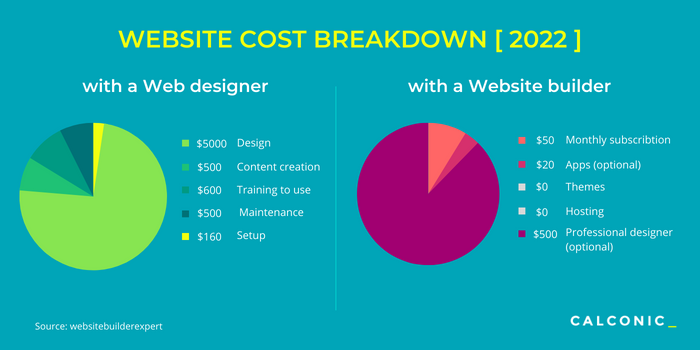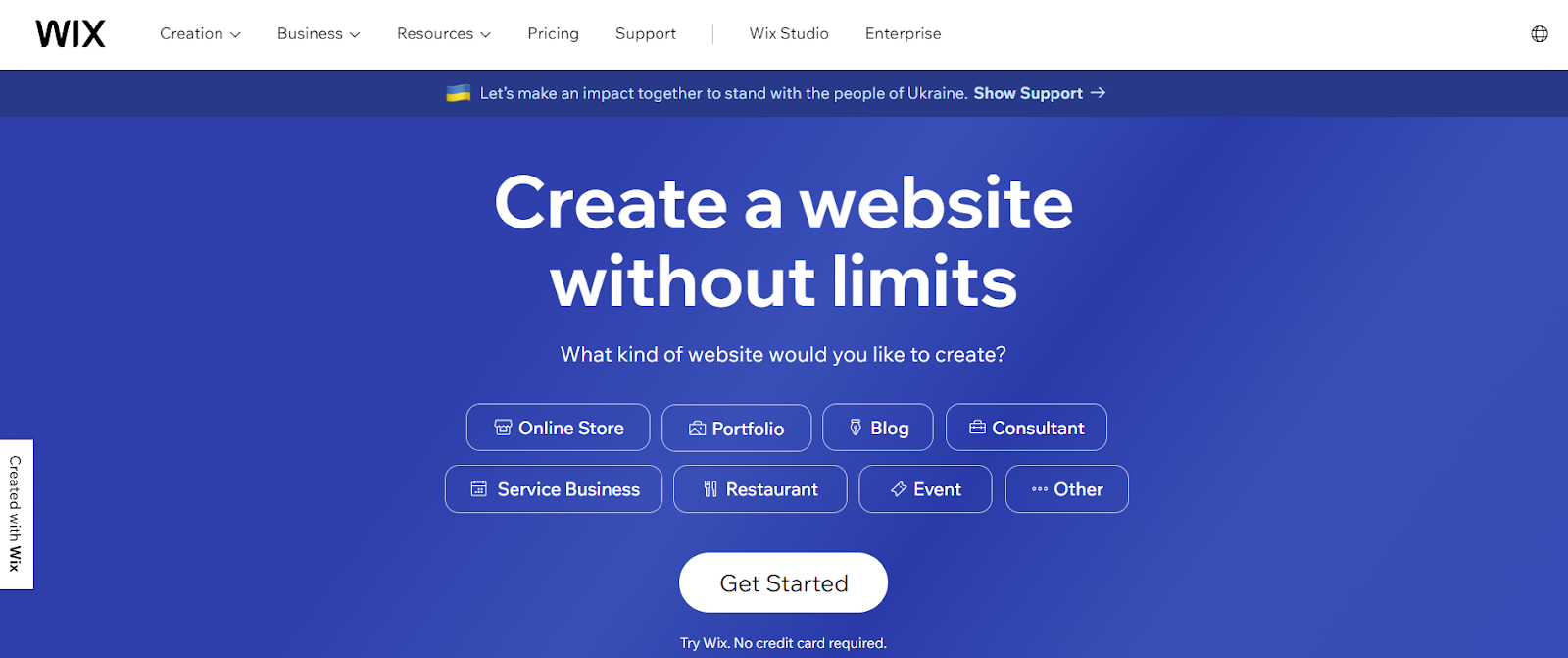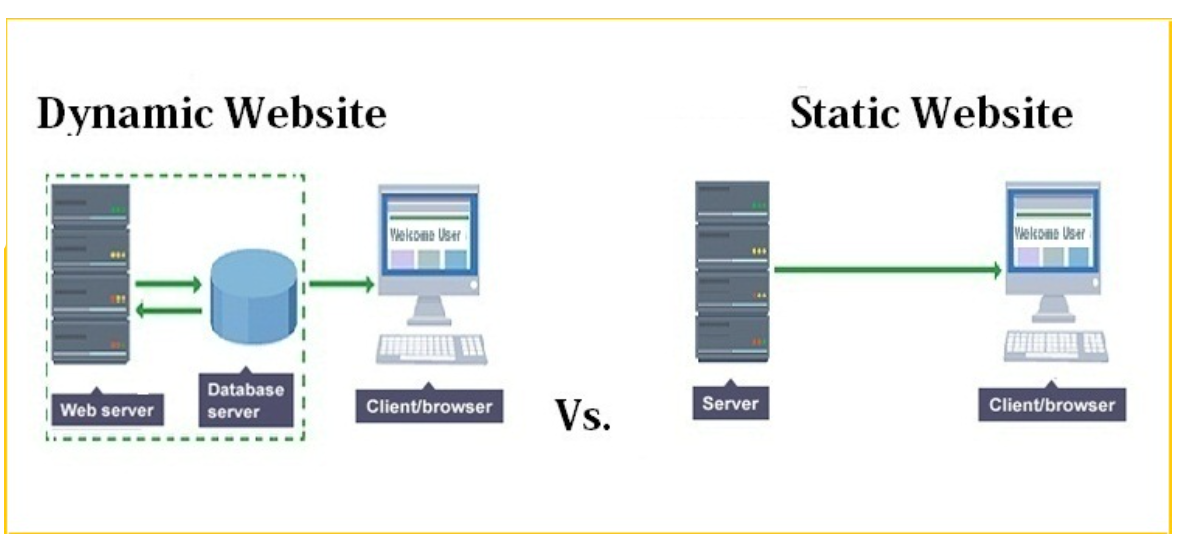Your website is like a storefront for your business. People who are interested in your goods or services can find out more about you and contact you through it. "How much does it cost to make a website?" is one of the most important questions for small business owners. This blog post will talk about the main things that affect how much a website costs for small businesses. It will also include tips on how to make a website, whether you do it yourself or hire someone to do it for you. Also, we'll talk about the difference between static and dynamic websites and help you decide which one is best for your business. Now let's begin.
In today's digital age, not having a website for your business is like having a phone without a battery - it may look the part, but it's rendered utterly ineffective. Consumers rely heavily on the internet to discover, research, and engage with businesses. Your website is your virtual storefront, where potential customers can learn about your products or services and get in touch with you. But one of the burning questions for small business owners is, "How much does it cost to create a website?" In this blog, we'll explore the key factors influencing website costs for small businesses and offer insights on how to create a website, whether you choose to build your own or hire a professional. We'll also explore the difference between static and dynamic websites and which might be right for your business. Let’s get started.
Table of Contents |

Website Cost for Small Business

The cost of creating a website for your small business can vary significantly based on several factors. Here are some key elements influencing the price:
1. Website Type: Static vs. Dynamic
Static Websites:
Simplicity: Static websites consist of fixed HTML files that don't change frequently. They are easy to develop and maintain, making them cost-effective.
Use Cases: Static websites are suitable for businesses that need a simple online presence with information that remains relatively unchanged, such as contact details, company information, and portfolios.
Dynamic Websites:
Complexity: Dynamic websites involve server-side scripting and databases. They can be more complex and costly due to features like e-commerce, user accounts, and real-time data.
Use Cases: Dynamic websites are ideal for businesses that require advanced functionality, interactive features, and frequent content updates. This includes online stores, blogs, membership sites, and web applications.
2. DIY or Professional Development
DIY Development:
Cost-Effective: Building your own website using DIY website builders or content management systems (CMS) can be cost-effective, especially if you have the necessary skills and time.
Customization: DIY solutions often provide templates and tools for customization, but the level of customization may be limited compared to professional development.
Professional Development:
High Quality: Hiring a professional web developer or agency ensures a polished, high-quality result. Your website can be tailored to your specific business needs and designed to meet industry standards.
Costs: Professional development tends to be more expensive due to the expertise and time required, but it can provide a more professional and feature-rich website.
3. Domain and Hosting Costs
Domain Name: The cost of a domain name can vary, depending on factors like the domain registrar you choose and the popularity of the domain you want. Some domains can be relatively inexpensive, while others may have a higher price tag.
Hosting: Hosting costs depend on factors like the hosting provider, the type of hosting (shared, VPS, dedicated), and the resources your website requires. Smaller businesses may start with shared hosting, which is generally more affordable.
4. Design and Content
Design: The design of your website is a critical factor in cost. Hiring a professional web designer can be an additional expense, but it ensures a visually appealing and user-friendly site.
Content Creation: Creating high-quality text, images, and potentially videos can be done in-house, but some businesses hire content creators or copywriters for this task, which adds to the overall cost.
5. Maintenance and Updates
Websites require ongoing maintenance and updates to ensure they remain secure, functional, and up to date. Maintenance tasks may include software updates, security monitoring, content updates, and bug fixes. Budgeting for these ongoing costs is essential to keep your website running smoothly and securely.
In conclusion, the cost of creating a website for a small business is influenced by various factors, and it's essential to consider each one when planning your website project carefully. Your budget, business needs, and goals will ultimately dictate the best approach for your specific situation. Whether you choose a simple static website or a feature-rich dynamic site, investing in a well-designed and well-maintained website can be a valuable asset for your small business in the digital age.
Pick Right - Factors that Contribute to Your Website Cost

Now, let's explore how to create a website for your small business:
1. Define Your Goals:
Audience: Identify your target audience. Who are you trying to reach with your website? Understanding your audience's needs and preferences is crucial for creating content and design that resonates with them.
Goals: Determine the primary objectives of your website. Are you looking to sell products, provide information, generate leads, or establish an online presence? Clear goals will shape the structure and content of your site.
Competitor Analysis: Research your competitors' websites. What are they doing well, and where can you offer something unique? This analysis can help you refine your website strategy.
2. Choose a Development Method:
DIY Website Builders: If you have technical skills and a tight budget, consider using DIY website builders like Wix, Weebly, or WordPress. They offer user-friendly interfaces and templates to simplify the development process.
Professional Web Developer: If you prefer a custom-designed website with advanced features or if you lack the time and expertise, hiring a professional web developer is a wise choice. They can create a unique and high-quality site tailored to your needs.
3. Plan Your Design:
Branding: Ensure your website's design aligns with your brand's identity. Consistency in color schemes, typography, and logo placement is essential for brand recognition.
User Experience (UX): Design your site with the user in mind. Create an intuitive navigation structure so visitors can easily find information. Mobile responsiveness is also critical, as many users access websites on smartphones and tablets.
Visual Elements: Choose images and graphics that complement your content and resonate with your audience. Use high-quality, relevant visuals to enhance the overall appeal.
4. Content Creation:
Text: Write clear, concise, and engaging content. Use headings, subheadings, and bullet points to make information digestible. Incorporate relevant keywords for better search engine optimization (SEO).
Images: Optimize images for fast loading and use alt text to improve accessibility. Visual content should enhance your message and be consistent with your brand.
Videos: If applicable, create and incorporate videos that showcase your products, services, or business story. Videos can be powerful for engaging visitors.
5. Domain and Hosting:
Domain Name: Choose a domain name that is easy to remember, relevant to your business, and not too complex. Research the availability of your preferred domain and register it through a domain registrar.
Hosting Provider: Select a reliable hosting provider with good uptime, security, and customer support. Ensure the hosting plan aligns with your website's needs, especially if you expect high traffic or have resource-intensive features.
6. Testing and Launch:
Testing: Thoroughly test your website on different browsers and devices to ensure it functions correctly. Check for broken links, page load speed, and responsiveness. Testing also includes verifying that contact forms and e-commerce features work as expected.
Content Review: Proofread all content for spelling and grammar errors. Ensure that it's factually accurate and up-to-date.
Security: Implement security measures to protect your website from malware and hacking.
Backup: Regularly back up your website to prevent data loss.
Once you've completed these steps, you're ready to launch your small business website. Promote it through your marketing channels, monitor its performance, and be prepared to make updates and improvements as needed to achieve your goals and better serve your audience. Creating a website is an ongoing process, and maintaining its relevance and effectiveness is key to its success.
Plan your Budget -Static vs Dynamic Websites

Understanding the difference between static and dynamic websites is essence to planning your budget:
|
|
|
|
|
|
|
|
|
|
|
|
|
|
|
|
|
|
|
|
|
|
|
|
|
|
|
|
|
|
|
|
|
|
|
|
|
|
|
|
|
|
|
|
Static Websites:
Simplicity: Static websites consist of fixed HTML files. Each page is a separate HTML file, and the content remains the same until someone manually updates it.
Cost-Effective: Static websites are generally more cost-effective to develop and host. They require less server-side processing and often use fewer resources.
Low Maintenance: Because content doesn't change frequently, maintenance is minimal. Updates typically involve manually editing HTML files.
Speed: Static sites tend to load faster since there's no need for server-side processing. This can provide a better user experience, especially for visitors with slow internet connections.
Security: Static sites are less vulnerable to certain types of hacking attacks since there's no database or complex server-side code.
Use Cases: Static websites are well-suited for businesses that need a simple online presence to showcase basic information, such as contact details, a portfolio, or a brochure-style site.
Dynamic Websites:
Complexity: Dynamic websites use server-side scripting languages like PHP, Python, or Ruby to generate pages on the fly. Content is often stored in databases.
Interactivity: Dynamic sites offer interactive features such as user accounts, e-commerce functionality, content management systems (CMS), and forums. Users can log in, submit forms, or engage with real-time data.
Content Updates: Content on dynamic websites can be easily updated through a CMS or by users themselves. This makes them suitable for businesses that frequently add, edit, or delete content.
Customization: Dynamic websites can be highly customized to meet specific business needs. They are flexible and can adapt to changing requirements.
Cost: Dynamic websites tend to be more expensive to develop and maintain due to the complexity of server-side scripting and the need for databases.
SEO-Friendly: Dynamic sites can be optimized for search engines more effectively because they allow for dynamic content creation and SEO-friendly URLs.
Use Cases: Dynamic websites are ideal for businesses that need advanced functionality, such as online stores, membership sites, blogs, and web applications. They are also suitable for businesses that frequently update content or require user interaction.
In summary, the choice between a static or dynamic website depends on your business's specific needs and goals. If you require a straightforward online presence with minimal updates, a static site may be sufficient and cost-effective. However, if you need advanced features, interactivity, and frequent content updates, a dynamic website provides the versatility and functionality necessary to meet those demands, even though it may come at a higher initial cost. It's essential to carefully assess your business requirements and budget when making this decision.
Bonus: When considering the cost of building a website for a small business, you must factor in all elements of the project. While many aspects can influence the final price, it's worth noting that investing in SEO expertise is a valuable bonus for your website. You may consider consulting an SEO expert firm that can help ensure your website is optimized for search engines. This makes it more likely to rank well in search results and attract organic traffic. And remember, the cost of hiring an SEO expert firm can vary depending on the services required and the firm's reputation, but it's a crucial investment to enhance your website's visibility and performance in the long run. So, while budgeting for your website, allocate resources for SEO consultation to maximize the potential of your online presence and drive business growth.
Read Also: How to redesign your site without destroying its SEO health?
Parting Note
Understanding the cost of building a website for a small business is crucial for effective budgeting and planning. While the expenses may vary, it's an investment worth making to establish a strong online presence. If you need help here, DO Communication is to help you navigate the process seamlessly. Connect with us for tailored solutions that align with your business goals and budget.
Frequently Asked Questions
Q1. How much does it cost to make a website for a small business?
The cost of creating a website for a small business can vary significantly based on several factors. These include the complexity of the website, whether it's static or dynamic, your choice between DIY development or hiring a professional, domain and hosting costs, design and content creation, and ongoing maintenance. For a basic static website, you can expect to spend a few hundred dollars, while dynamic websites with advanced features may cost several thousand dollars.
Q2. How do I create a website for my small business?
Creating a website for your small business involves several steps:
- Define your website's purpose and goals.
- Choose a domain name and hosting provider.
- Determine your website's platform, such as a website builder, CMS, or custom development.
- Select a website template or theme.
- Create your website's structure and design.
- Add content, including text, images, and videos.
- Optimize your website for mobile responsiveness and SEO.
- Implement security measures.
- Publish your website and promote it to your target audience.
- Regularly update and maintain your website to keep it secure and up-to-date.
Q3. How to make a small business website in 2023?
In 2023, the process of creating a small business website remains consistent with the steps mentioned above. However, you may want to pay special attention to the following trends:
Mobile-First Design: Prioritize mobile responsiveness in your website design.
Content Quality:Focus on high-quality, engaging content that resonates with your target audience.
Voice Search Optimization: Consider optimizing your content for voice search.
E-commerce Integration: If applicable, incorporate e-commerce functionality to sell products or services online.
Security: Ensure strong security measures are in place to protect your website and user data.
Q4. Is a business website free?
While there are free website-building platforms available, they often come with limitations in terms of customization, branding, and features. To create a professional, fully customized business website, it's recommended to invest in a domain name, hosting, and potentially web development or design services. While there are costs involved, the investment in a business website is essential for establishing a strong online presence and reaching your target audience effectively.
Q5. What is the cheapest way to build a website?
The most cost-effective way to build a website for your small business is by using website builders like Wix, Weebly, or WordPress.com. These platforms offer affordable plans, templates, and user-friendly tools, making it possible to create a professional website without the need for extensive technical expertise. Additionally, you can save costs by handling content creation and updates in-house and using budget-friendly hosting options.


